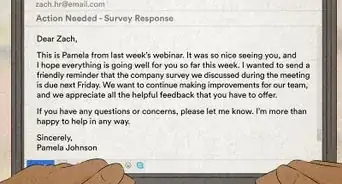This article was co-authored by Asa Don Brown, PhD, DNCCM, FAAETS and by wikiHow staff writer, Eric McClure. Dr. Asa Don Brown is a Clinical Psychologist with over 25 years of experience. He specializes in working with families, children, and couples, treating a variety of psychological disorders, trauma, and abuse. Dr. Brown has specialized in negotiation and profiling. He is also a prolific author having published three books and numerous articles in magazines, journals, and popular publications. Dr. Brown earned a BS in Theology and Religion with a minor in Marketing and an MS in Counseling with a specialization in Marriage and Family from The University of Great Falls. Furthermore, he received a PhD in Psychology with a specialization in Clinical Psychology from Capella University. He is also a candidate for a Masters of Liberal Arts through Harvard University. Dr. Brown is a Fellow of the American Academy of Experts in Traumatic Stress and a Diplomate for the National Center for Crisis Management and continues to serve a number of psychological and scientific boards.
There are 18 references cited in this article, which can be found at the bottom of the page.
This article has been viewed 50,678 times.
If you’re trying to figure out whether your relationship has a healthy, normal amount of fighting, you aren’t alone. It can hurt to feel like you’re locked in combat with the person you care about more than anyone else in the world, and the feelings associated with a fight can leave you wondering whether your relationship is working or not. We’ve got good news for you—fighting is healthy, productive, and totally normal. If you want to learn more about why this is the case, as well as pick up a few tips and tricks for handling arguments more productively, we’ve got you covered.
This article is based on an interview with our clinical psychologist and published author, Asa Don Brown. Check out the full interview here.
Steps
Is it healthy to never fight in a relationship?
-
1No, it generally means that someone is avoiding conflict. If you and your partner never get into it, it means that one of you is holding back.[5] It’s impossible for two people to be around each other all the time and agree on absolutely everything. If there’s zero conflict, it indicates that one of you (or both of you) are not speaking your truth, which can be very problematic in the long run.[6]
- If the relationship is kind of fresh, don’t worry about your lack of fighting. It’ll happen naturally over time. It’s normal for the beginning of a relationship to be extremely peaceful.[7]
- You don’t need a ton of fighting for it to be considered healthy. It’s perfectly fine if you and your partner only come into conflict a few times a year. Every couple is different when it comes to the frequency.[8]
-
2Avoidance is more destructive over time than fighting. The consequences of conflict avoidance become more dramatic the longer it goes on.[9] If one of you is bottling things up, it can lead to resentment, frustration, and even despair. If the two of you have been together for a long time, it’s worth having a conversation about why you never argue if this sounds like you. Yes—the two of you might need to argue about not arguing.[10]
- Avoidance can create an environment where it becomes increasingly difficult to be honest.
- If you hold back on something small that’s irking you, it will eventually feel like a massive irritation.
- Perpetual avoidance makes it hard for a couple to cultivate boundaries, since neither partner will learn where the lines are for one another.
- If you’re the one avoiding a tough conversation, the stress of trying to tiptoe around talking about it all the time is going to build up and make you scared or sad to engage with your partner.
Is it normal to fight every day in a relationship?
-
1It’s normal (up to a point) if you’re negotiating a complex problem. If the two of you are engaging in a sustained argument over a complex issue—like a large debt, an addiction, or infidelity—then it makes sense that you’d be fighting daily. So long as your arguments are calm and productive, and the fighting doesn’t go on for months, it’s not the end of the world.[11]
- It takes time to work out an understanding over a complicated issue. It’s impossible to resolve an issue like cheating overnight.
- None of this is to say that it should go on for months and months at a time. A week of arguing here or a few days of disagreement there isn’t a big deal, though.
-
2It’s not normal to fight daily over every little thing. If you’re in a volatile relationship where you’re shouting at one another over seemingly unimportant stuff every day, something is wrong.[12] This often happens when there’s an underlying problem that is going unaddressed. Take a step back and sit down with your partner. Try to have a calm, respectful conversation about what’s really going on here. If that doesn’t work, see a couple’s counselor. They’ll help the two of you get to the root of the problem.[13]
- For example, if one person feels like the other partner doesn’t respect them, they may lash out over dishes not being done, a playful joke their partner makes, or their partner not picking up the phone. Until the source of the problem is addressed, the fighting will just continue.
-
3A lot of this depends on how comfortable you are with conflict. Whether fighting every day is an issue or not depends largely on how you and your partner feel about it. If both of you love debating, and you both grew up in a fast-paced environment where people bickered (out of love) regularly, you may be totally fine with it. If the conflict isn’t stressing either of you out, it probably isn’t a big deal.[14]
- If the fighting is super stressful for you, your partner, or the both of you, then it’s a problem. You shouldn’t be doing something every day if it makes you unhappy.
- Everybody has their own threshold for this stuff, so focus on how it makes you feel more than how often it happens.
How can I make fights in a relationship more productive?
-
1Approach the conversation from an empathetic, calm perspective. If it’s “me vs. you” instead of “us vs. the problem,” things can go off the rails real fast. Actively hear your partner out, don’t interrupt them, and use a cool tone to respond—even if you’re really upset. If both of you can be respectful and calm, you can work towards a solution.[16]
- It often helps to remind yourself in your head, “I love this person, I care about them, don’t say something you’ll regret.”
- Do not try to “win.” There’s no winning here. It’s not a zero-sum game—the goal is to resolve a problem. You can only do that if you don’t approach arguments like they’re competitions.
-
2Set ground rules and call timeouts whenever things heat up. Have a conversation about your fights when the two of you are calm and establish some guidelines. Agree to never interrupt one another, and focus exclusively on whatever the issue is. If something is “off limits,” discuss it ahead of time. Come up with a safe word (“timeout” is fine) so that you can pause the conversation if things get too heated for either of you.[17]
- Schedule time to argue! Knowing ahead of time that you’re going to argue takes a lot of the unpredictability out of it.
- Start each fight by agreeing on an objective. This way, you can both work towards a solution instead of spinning your wheels going back and forth. This is especially key if the two of you have been having the same fight over and over again, which happens when there’s no roadmap for the argument!
-
3Use “I” language and avoid attacking who your partner fundamentally is. If one of you keeps saying “you never…” or “you don’t…” it can feel like a boxing match. Frame things from your personal perspective and talk about the way you feel in an argument. This is one of those small things that can really improve the quality of your conversations when the two of you disagree.[18]
- For example, let’s say you’d normally say something like, “You never clean up around the house. You make things so dirty! You let this kitchen just get so dirty and then I get stuck cleaning it up.” Using the “I” rule, you might say, “I feel like I’m doing all of the work around here when the kitchen gets left like this. I know I can be a bit of a clean freak, but it’s really important to me.”
- Name calling will get you absolutely nowhere. Just don’t do it.
How long into a relationship is it normal to fight?
-
1Fighting typically starts after the honeymoon phase has ended. When a relationship is new and exciting, you tend to romanticize things and ignore potential problems. There’s absolutely nothing wrong with that. Once this early period of the relationship is over, couples tend to be more realistic.[19] This is when the occasional fight starts cropping up, and that’s totally normal.[20]
- It may be surprising, but the honeymoon phase often lasts 6-12 months! It takes time, so don’t freak out that your relationship is dying if you’ve been together for a full year and now you’re suddenly fighting.[21]
-
2Your fighting will develop a cadence and style over time. Every couple fights differently. Over time, you and your partner should develop a “style” to your arguments. So long as the two of you are respectful, fair, and empathetic when you argue, your relationship will take on a texture of its own in this department.[22]
- Some couples have really quiet, tepid fights. Other couples have fights that take on a more “business-like” tone. Some relationships have arguments that reach tears, and some require makeup sex for the calm version of the argument to even take place. Everyone is different in this department, and that’s okay.
- Fighting is a little bit of an art. If you and your partner aren’t fighting productively and it’s early on in the relationship, keep working at it![23]
How do I know if a fight is turning toxic?
-
1Threats and ultimatums are signs that things are turning south.[25] Any variation of “if you don’t do X, I will do Y” is going to be a sign that things are getting sour and the fighting is becoming unproductive. Conflict in a relationship shouldn’t be about negotiating or restricting your partner’s behavior, and ultimatums and threats are sign that you should pause the fight and return to it when the two of you are calmer.[26]
- People often make these kinds of dramatic gestures when they get extremely heated, so it’s essential to pause if either you or your partner start venturing into this territory; just stop the conversation.
-
2Name-calling and personal attacks are toxic behaviors in a relationship.[27] If one of you starts veering off of the central conflict and into a more aggressive area where you’re insulting one another or calling names, stop. The conversation is going to turn into a boxing match where the two of you just exchange barbs until someone gets hurt. Call the behavior out, reframe the conversation, and either return to the central topic or end the conversation.[28]
- For example, if your partner calls you a name, you might say, “Hey, that’s unfair. I’m not insulting you, so don’t call me names. It’s unproductive.” If it can’t be handled that way, exit the conversation.
- Think about the difference between “I feel like you’re being irresponsible,” versus, “You’re irresponsible.” Keep things focused on your feelings, not their behavior, and don’t put your partner down.
-
3Any kind of physical aggression is totally unacceptable.[29] Domestic abuse is never okay, and if anyone is hitting things, throwing stuff, or putting their hands on one another, it’s crossing a line. Get away and go get help. It’s not your fault, and you are absolutely not alone, but you must do your best to not make excuses for it.[30]
- Do not hesitate to call 911 if you’re in trouble. You can also reach out to National Domestic Violence Hotline at 1-800-799-7233 or 1-800-787-3224 (TTY) to get some free help.
What causes fights in a relationship?
-
1A lot of fights just boil down to miscommunication. Someone might say the wrong thing, interpret sarcasm where none exists, or misunderstand the intention of an offhanded comment. If two people fail to communicate in a way that feels equitable and honest, it can start all kinds of crazy arguments. Taking a step back to make sure you’re on the same page is huge here.[31]
- This is one of the reasons beings honest and vulnerable is so important in a relationship. If you get into the habit of not sharing how you feel or lying about what you’re thinking, it can generate friction in the relationship.
-
2A lack of commitment is the biggest trigger for disagreement. This can take a variety of different forms, but the underlying issue is usually the same—one person expects a level of commitment that they aren’t getting. Whether it’s not showing up on time to a date, never getting their partner a gift, or a refusal to take a relationship to the next level, an imbalance in expectations of commitment is the largest driver of conflict in a relationship.[32]
- This is why couples argue over things like doing the dishes. One partner expects a level of commitment when it comes to taking care of a shared space and when they don’t get that, it feels like a serious violation.[33]
-
3Fundamental differences in values are common triggers for fights. If each of you have different religious beliefs or political values it can cause some serious friction. This can also extend to your desire to have children in the future, or your finances. These underlying, core components of who and what you are can cause serious fights.[34]
- These conversations often erupt into arguments because these issues can feel deeply personal and it’s hard to compromise on this stuff for most folks. You can absolutely come to a resolution on these issues if you’re calm and take your time, though.
- The good news here is that if you can find any kind of middle ground early on, these issues are often very easy to move on from. If you’re in a ton of debt and your partner is wealthy, making a rule like, “No fancy vacations until the debt is fixed, and no money lending but gifts are okay,” can really curb the fights.
References
- ↑ Asa Don Brown, PhD, DNCCM, FAAETS. Clinical Psychologist. Expert Interview. 3 February 2022.
- ↑ Asa Don Brown, PhD, DNCCM, FAAETS. Clinical Psychologist. Expert Interview. 3 February 2022.
- ↑ https://www.theguardian.com/lifeandstyle/2018/feb/13/couples-who-argue-together-stay-together-research-finds
- ↑ Asa Don Brown, PhD, DNCCM, FAAETS. Clinical Psychologist. Expert Interview. 3 February 2022.
- ↑ Asa Don Brown, PhD, DNCCM, FAAETS. Clinical Psychologist. Expert Interview. 3 February 2022.
- ↑ https://www.ncbi.nlm.nih.gov/pmc/articles/PMC3274734/
- ↑ https://www.primermagazine.com/2013/love/surviving-the-end-of-the-honeymoon-period
- ↑ https://www.ncbi.nlm.nih.gov/pmc/articles/PMC3274734/
- ↑ Asa Don Brown, PhD, DNCCM, FAAETS. Clinical Psychologist. Expert Interview. 3 February 2022.
- ↑ https://www.theguardian.com/lifeandstyle/2018/feb/13/couples-who-argue-together-stay-together-research-finds
- ↑ https://time.com/5402188/how-to-fight-healthy-partner
- ↑ https://www.ncbi.nlm.nih.gov/pmc/articles/PMC3274734/
- ↑ https://www.theguardian.com/lifeandstyle/2020/jan/03/how-to-stop-having-the-same-argument-again-and-again-and-again
- ↑ https://www.ncbi.nlm.nih.gov/pmc/articles/PMC2953261/
- ↑ https://www.ncbi.nlm.nih.gov/pmc/articles/PMC3274734/
- ↑ https://time.com/5402188/how-to-fight-healthy-partner/
- ↑ https://www.nbcnews.com/better/pop-culture/want-better-marriage-learn-fight-fair-5-easy-steps-ncna806011
- ↑ https://time.com/5402188/how-to-fight-healthy-partner/
- ↑ Asa Don Brown, PhD, DNCCM, FAAETS. Clinical Psychologist. Expert Interview. 3 February 2022.
- ↑ https://depauliaonline.com/46454/artslife/relationship-advice-for-when-the-honeymoon-phase-ends/
- ↑ https://ohioline.osu.edu/factsheet/FLM-FS-2-01-R10
- ↑ https://www.ncbi.nlm.nih.gov/pmc/articles/PMC3274734/
- ↑ https://cmhc.utexas.edu/fightingfair.html
- ↑ https://counseling.sa.ua.edu/resources/healthy-vs-unhealthy-relationships/
- ↑ Asa Don Brown, PhD, DNCCM, FAAETS. Clinical Psychologist. Expert Interview. 3 February 2022.
- ↑ https://now.tufts.edu/articles/6-ways-couples-can-resolve-conflict-during-covid-19-crisis
- ↑ Asa Don Brown, PhD, DNCCM, FAAETS. Clinical Psychologist. Expert Interview. 3 February 2022.
- ↑ https://now.tufts.edu/articles/6-ways-couples-can-resolve-conflict-during-covid-19-crisis
- ↑ Asa Don Brown, PhD, DNCCM, FAAETS. Clinical Psychologist. Expert Interview. 3 February 2022.
- ↑ https://www.un.org/en/coronavirus/what-is-domestic-abuse
- ↑ https://www.fatherly.com/health-science/intimacy-commitment-married-couples-fight-about-most/
- ↑ https://www.ncbi.nlm.nih.gov/pmc/articles/PMC4012696/
- ↑ https://www.psychologytoday.com/us/blog/love-lies-and-conflict/201801/the-most-common-cause-useless-relationship-fights
- ↑ https://www.ncbi.nlm.nih.gov/pmc/articles/PMC4012696/














































































